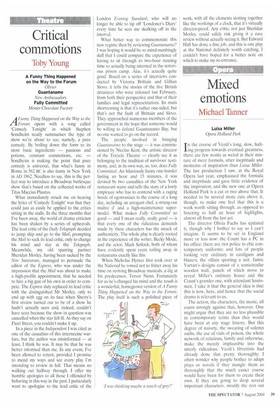Critical commotions
Toby Young
A Funny Thing Happened on the Way to the Forum Olivier Guantanamo New Ambassadors Fully Committed Menier Chocolate Factory'
AFunny Thing Happened on the Way to the .Forum opens with a song called 'Comedy Tonight' in which Stephen Sondheim neatly summarises the type of show we're about to see; namely, a pure comedy. By boiling down the form to its most basic ingredients — passions and potions, constant commotions, etc. — Sondheim is making the point that pure comedy is universal, that what's funny in Rome in 562 BC is also funny in New York in AD 1962. Needless to say, this is the perfect way to introduce a Broadway burlesque show that's based on the collected works of Titus Maccius Plautus.
What immediately struck me on hearing the lyrics of 'Comedy Tonight' was that they could just as easily be applied to the critics sitting in the stalls. In the three months that I've been away, the world of drama criticism has been shaken by a series of upheavals. The lead critic of the Daily Telegraph decided to jump ship and go to the Mail, prompting the Mail to sack its lead critic, only to change his mind and stay at the Telegraph. Meanwhile, my old sparring partner Sheridan Morley, having been sacked by the New Statesman, managed to persuade the editor of the Express, who was under the impression that the Mail was about to make a high-profile appointment, that he needed to hire a big gun of his own in order to compete. The &press duly replaced its lead critic with the distinguished Mr Morley, only to end up with egg on its face when Sherry's first review turned out to be of a show he hadn't actually seen and, indeed, couldn't have seen because the show in question was cancelled when the star fell ill. As they say on Fleet Street, you couldn't make it up.
In a piece in the Independent! was cited as one of the casualties of this internecine warfare, but the author was misinformed — at least, I think he was. It may be that he was better informed than me. In any event, I've been allowed to return, provided I promise to mend my ways and see every play I'm intending to review in full. That means no walking out halfway through. I offer my humble apologies to all those I offended by behaving in this way in the past. I particularly want to apologise to the lead critic of the London Evening Standard, who will no longer be able to tip off 'Londoner's Diary' every time he sees me skulking off in the interval.
What better way to commemorate this new regime than by reviewing Guantanamo? I was hoping it would he so mind-numbingly dull that I could compare the experience of having to sit through its two-hour running time to actually being interned in the notorious prison camp. Alas, it's actually quite good. Based on a series of interviews conducted by Victoria Brittain and Gillian Slovo, it tells the stories of the five British detainees who were released last February, from both their perspective and that of their families and legal representatives. Its main shortcoming is that it's rather one-sided, but that's not the fault of Brittain and Slovo. They approached numerous members of the government in the hope that someone would be willing to defend Guantanamo Bay, but no one wanted to go on the record.
The people involved in bringing Guantanamo to the stage — it was commissioned by Nicolas Kent, the artistic director of the Tricycle Theatre — clearly see it as belonging to the tradition of survivors' testimony, and, in its own way, so, too, does Fully Committed. An hilariously funny one-bander lasting an hour and 15 minutes, it was devised by two casualties of the New York restaurant scene and tells the story of a lowly employee who has to contend with a raging horde of egomaniacs in the course of a long day, including an arrogant chef, a strung-out maitre d' and a high-maintenance supermodel. What makes Fully Committed so good — and I mean really, really good — is that every one of the ridiculous demands made by these characters has the smack of authenticity. The whole play is clearly rooted in the experience of the writer, Becky Mode, and the actor, Mark Setlock, both of whom have evidently spent years toiling away in restaurants exactly like this.
When Nicholas Hytner first took over at the National he vowed not to fritter away his time on reviving Broadway musicals, a dig at his predecessor, Trevor Nunn. Fortunately for us he's changed his mind and the result is a wonderful, homegrown version of A Funny Thing Happened on the Way to the Forum. The play itself s such a polished piece of
work, with all the elements slotting together like the workings of a clock, that it's virtually director-proof. Any critic, not just Sheridan Morley, could safely risk giving it a rave review without actually seeing it. But Edward Hall has done a fine job, and this is one play at the National definitely worth catching. I couldn't have hoped for a better note on which to make my re-entrance.


























































 Previous page
Previous page